Manga cafes (manga kissa) got their start in Nagoya back in 1979 as a style of coffee shop offering a large collection of manga comics available for customers to read on the premises. Those familiar with the early era of the manga cafes are likely to remember rather cramped and dim shops where customers were absorbed in reading manga and did little else. Such images, however, are a thing of the past. The manga cafes of today are bright and spacious--places where anyone can feel comfortable, even a young woman entering alone.
Reading manga is not the only pastime offered by manga cafes today. Customers can now access the Internet, view DVDs, play video games, or relax in a massage chair. The approximately 2,000 manga kissa throughout Japan are thus multipurpose spots for relaxation and diversion, now a familiar part of daily life.
|
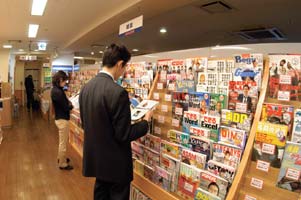
Many of the customers at this Shibuya manga cafe are the young people in
their late teens and early twenties who frequent this Tokyo commuter and
shopping/entertainment hub. Six to seven-hundred people visit daily, and
on busy weekend evenings, all of its 144 seats are likely to be taken.
During the day, men and women often take a break from their work to stop
by, and in the evening and nighttime the cafe is a popular stop-off for
students and working people on their way home. The shop's shelves are lined
with some 40,000 manga, magazines, and photo collections. |
 |
 |
Television is of course available, and customers are free to watch any of 70
DVD titles and listen to any of the 200 music CDs available in the cafe.
There are also about 300 video game titles to choose from for use with
the PS2 and X-Box consoles. These cafes are also popular as places to
go with a friend or a date to sit in a love seat and watch movies or
enjoy video games.
 |
 |
Every week the cafe posts a ranking of the most popular manga. This week they are, from first to fifth: Tenisu no oji sama [The Prince of Tennis], Bagabondo [Vagabond], Ai yori aoshi [True Blue Love], Doragonboru [Dragon Ball], and Beruseruku [Berserk].

|
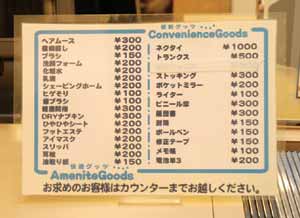 |
| |
Visiting
a Manga Kissa
|
| Step
1. |
 |
Step 2. |
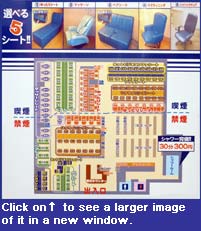 |
| First you visit the reception counter. |
Choose your seat preference: There are five types, including massage chairs and
recliners. All types of seats cost the same. |
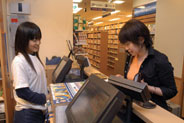 |
  |
| Step 3. |
| Select non-smoking or smoking. |
| |
|
 |
*For the health and protection of young people and in order to prevent damage and crime, the Japan Complex Cafe Association issues strict store operation guidelines. Staff make regular rounds of customers to forestall underage drinking and smoking. Customers under the age of 16 after 8 p.m. and customers under 18 years of age after 10 p.m. are not permitted on the premises. |
| Step 5. |
 |
Step 4. |
| Kick back and relax! |
Decide how long you
will use the facilities and pay your tab. The rate is 400 yen per hour,
and 100 yen for every 15 minutes that you extend your stay. The three-hour
set rate at 880 yen and the six-hour set rate at 1,180 yen are a bargain. |
 |
Manga
Kissa Yesterday and Today
|
| 1979 |
Manga kissa originate in Nagoya. Coffee-house style. |
| 1997 |
The library-style manga kissa emerges, featuring long tables with chairs around them. Shops offer collections of about 5,000 to 15,000.
|
| 1998 |
About 300 stores nationwide. Manga kissa become established fixtures of popular culture and more stores open. |
| 1999 |
Increasing number of stores introduce facilities for amusement, such as Internet access and video games, and amenities like reclining chairs and free self-service drink bars. The standard style for today's manga kissa is established. |
| 2000 |
Transition from manga kissa to multifaceted cafe. Growing number of stores in which all seats are equipped with television and computer monitors, allowing customers to enjoy TV, DVDs, video games, Internet, etc. |
| 2001 |
Number of manga kissa as multifaceted cafes reaches 1,500 nationwide.
|
| 2002 |
Manga kissa business expands to 2,000 stores nationwide. Internet connections upgraded with the installation of fiber-optic lines, etc. |
*For CDs, DVDs, and video games, manga cafes market use of these media to customers under their user licenses acquired according to copyright law. Books and magazines, however, are circulated free of charge because there are no regulations regarding their rental in Japan. Manga artists and publishing firms claim that if these practices continue, not only will authors not receive a fair return on the profits generated by manga kissa but the number of manga buyers will decrease, causing the manga market to collapse. They hope for a revision to the current law that will acknowledge "lending rights," allowing them to collect copyright use fees on published materials similar to that for other media. Discussion of these proposals is currently underway. |
 まんが@カフェ
ゲラゲラ まんが@カフェ
ゲラゲラ
Manga@Cafe Gera Gera, Udagawacho branch, Shibuya. This chain has 47 branches
nationwide. |
| Photos: Hongo Jin |








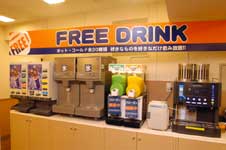
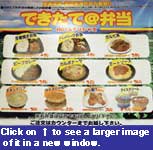

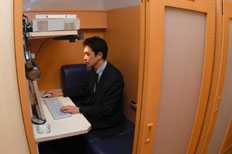





 まんが@カフェ
ゲラゲラ
まんが@カフェ
ゲラゲラ